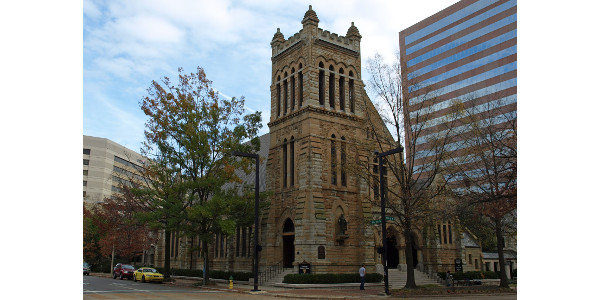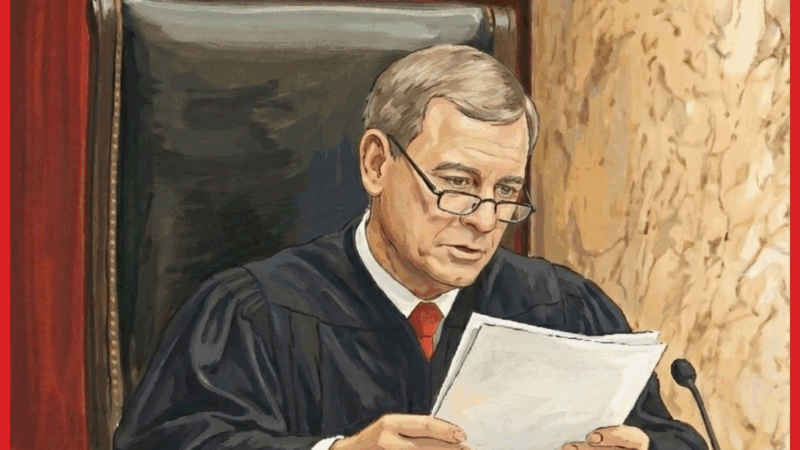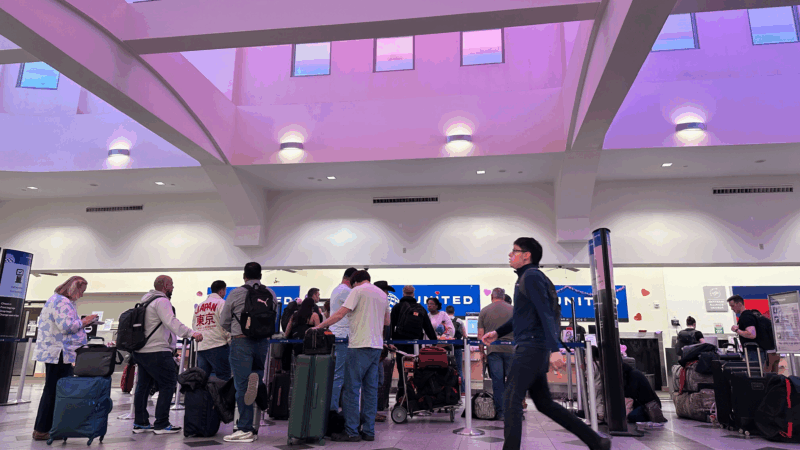Churches Maintain Stance Against Gay Marriage Despite Cultural Shifts
Cathedral Church of the Advent in downtown Birmingham maintains a traditional stance on marriage. A majority of Americans support gay marriage and the U.S. Supreme Court is expected to rule on this issue this summer.
The U.S. Supreme Court is set to rule this summer on a case that could legalize same-sex marriage and even many opponents of gay marriage don’t expect the court to rule in their favor. Public support of same-sex marriage has swung dramatically in recent years with a majority of Americans now favoring it. At least 545 gay couples married in Alabama earlier this year during the three weeks it was legal.
But many churches in the state still embrace a traditional view of marriage and find themselves increasingly within a culture that doesn’t see things their way.
Patrick Sellers, senior pastor at Mt. Zion Missionary Baptist Church in Birmingham, remains undeterred in his view.
“God doesn’t make any mistakes,” said Sellers. “A person can choose to be gay. I can’t choose to be black.”
He says he doesn’t advocate mistreating anyone, but the Bible is clear that homosexuality is wrong. No U.S. Supreme Court case will change that.
“It doesn’t matter even what the government says, “ Sellers said. “It doesn’t even matter what society says. We’re the church of the living God. We’re going to stand on God’s word. And that’s where we’re going to say.”
Some evangelicals argue their position does attract people. They say individuals are coming to conservative churches from mainline Protestant denominations as such groups have become more friendly to gay causes. Mainline Protestants have seen steep declines in the share of Americans who identify with them. But Clemson University sociologist Andrew Whitehead says evangelical churches have seen their share drop too. A recent Pew Research Center survey found dip of one percent since 2007.
“Granted they are doing better than mainline Protestant congregations,” said Whitehead. “But I wouldn’t say that they’re growing because they are maintaining this traditional view of marriage or traditional stance toward homosexuality.”
Whitehead says even among evangelicals, the people in the pews are becoming more accepting of gay marriage even if the organizations are not.
Living with a Minority View
At the Cathedral Church of the Advent, an Episcopal church in downtown Birmingham, Dean Andrew Pearson feels the tension. The denomination has elected a gay bishop and allowed for blessings of same-sex unions. He says Advent has active gay and lesbian members. But the official position of the parish is in support of traditional marriage.
“Now that being said, the folks in our congregation, regardless of their sexual orientation who would be in disagreement with our official stance are still here,” said Pearson. “Because our relationships are marked by love. We know one another. We work with one another. We have a shared life together.”
Doug Webster teaches about Christianity and culture at the evangelical Beeson Divinity School at Samford University. He says Christians who support traditional marriage shouldn’t hide their views in a pluralistic society.
“That may mean that the church is increasingly ostracized and marginalized and disenfranchised,” said Webster. “But I think as Christians we really do need to learn to how to accept that graciously.”
However, Southern Illinois University sociologist Darren Sherkat says there is a split between the big picture and the small picture. He says attitudes on gay marriage are changing nationally. But in localized spots, such as Alabama, opposition remains high and religious leaders promoting traditional marriage will continue to have influence.
Sherkat says mixing religion and politics, whether liberal or conservative viewpoints, does drive congregants away. But he believes deemphasizing political issues can reverse that. He points to the Roman Catholic Church, where Pope Francis has made statements expressing more openness to gays and lesbians.
“I expect in the next two or three years I’m going to see an uptick as people who used to be Catholic who said, ‘I’m done with it,’ are going to come back to the church,” said Sherkat.
However the Catholic Church’s positions on homosexuality and same-sex marriage remain the same. That mere de-emphasis, without a policy change, may feel incomplete to gays and lesbians pushing for full acceptance.
What specifically acceptance means is a source of struggle for Beeson’s Doug Webster as he navigates friendships with gay individuals. He suggests if complete agreement is necessary, that may not be a strong friendship.
“I think most individuals that are dealing with same-sex attraction really want total acceptance,” said Webster. “Anything short of that is perceived by them as being either disrespectful or antagonistic. I afraid we’re going to have to…from a biblical point of view as I perceive it, we’re going to have to live with that.”
Many evangelical voices may be standing firm on their core views, but the evangelical community isn’t free from debate over gay rights as the New York Times reports. While cultural and legal acceptance of gays and lesbians has moved increasingly in their favor, any changes in conservative Alabama churches will likely be much longer.
Updated with additional quotes and New York Times link June 10, 2015.
House GOP pushes strict proof-of-citizenship requirement for voters
House Republicans rushed to approve legislation on Wednesday that would impose new proof-of-citizenship requirements ahead of the midterm elections, a Trump administration priority that faces blowback in the Senate.
In blunt warning, the U.S. says Peru could lose its sovereignty to China
The Trump administration on Wednesday expressed concern that China was costing Peru its sovereignty after a Peruvian court ruling restricted a local regulator's oversight of a Chinese-built mega port.
U.S. ice dancers Madison Chock and Evan Bates win Olympic silver, in a stunning upset
Chock and Bates, four-time Olympians, were heavily favored for gold. But they lost by less than two points to a French duo who has been clouded by controversy involving their former partners.
AI brings Supreme Court decisions to life
Like it or not, the justices are about to see AI versions of themselves, speaking words that they spoke in court but that were not heard contemporaneously by anyone except those in the courtroom.
These monks’ walk for peace captivated Americans. It ends this week
A group of Buddhist monks walked from Fort Worth, Texas, to Washington, D.C., in the name of peace. The 108-day pilgrimage captivated Americans.
The airspace around El Paso is open again. Why it closed is in dispute
The Federal Aviation Administration abruptly closed the airspace around El Paso, only to reopen it hours later. The bizarre episode pointed to a lack of coordination between the FAA and the Pentagon.





